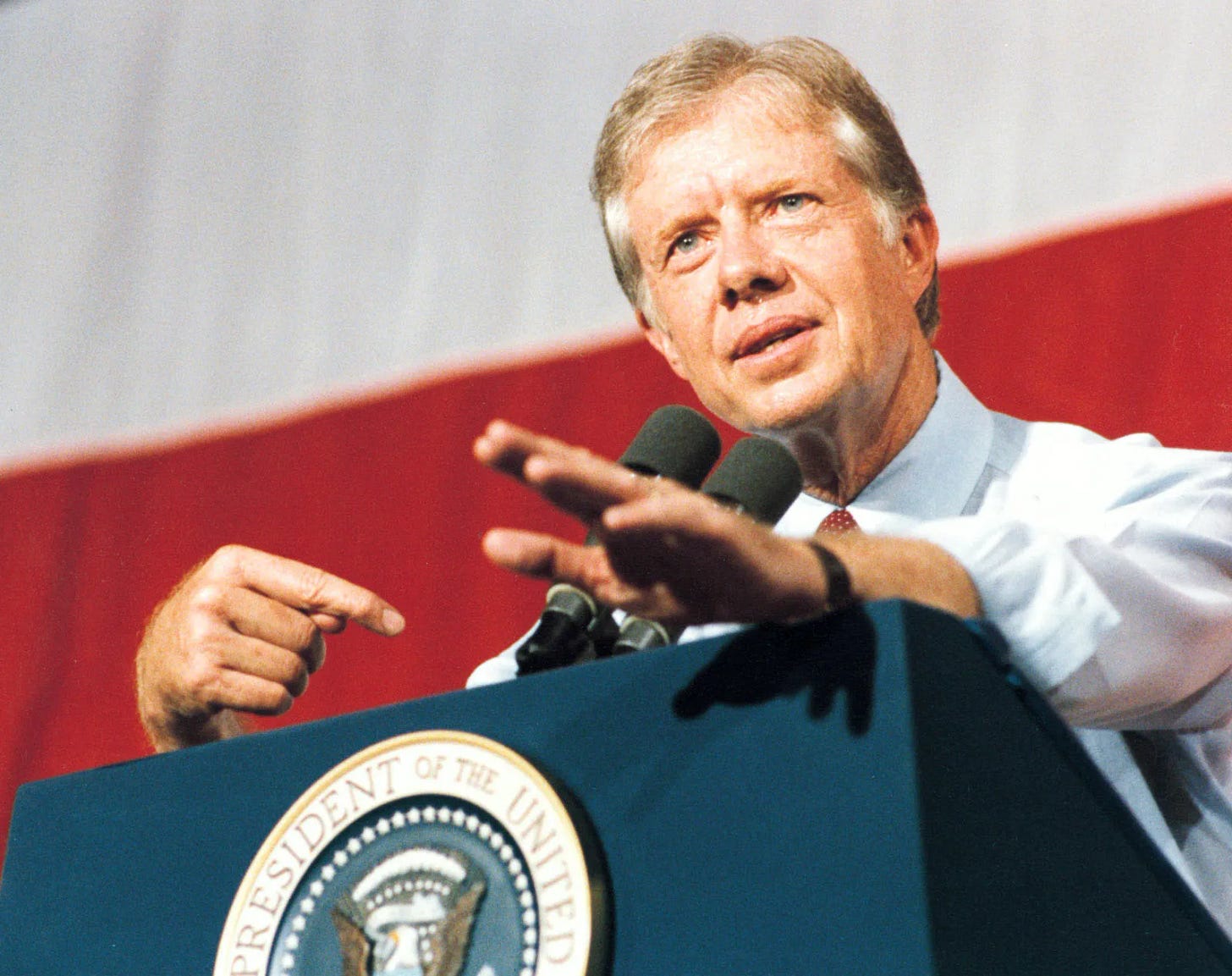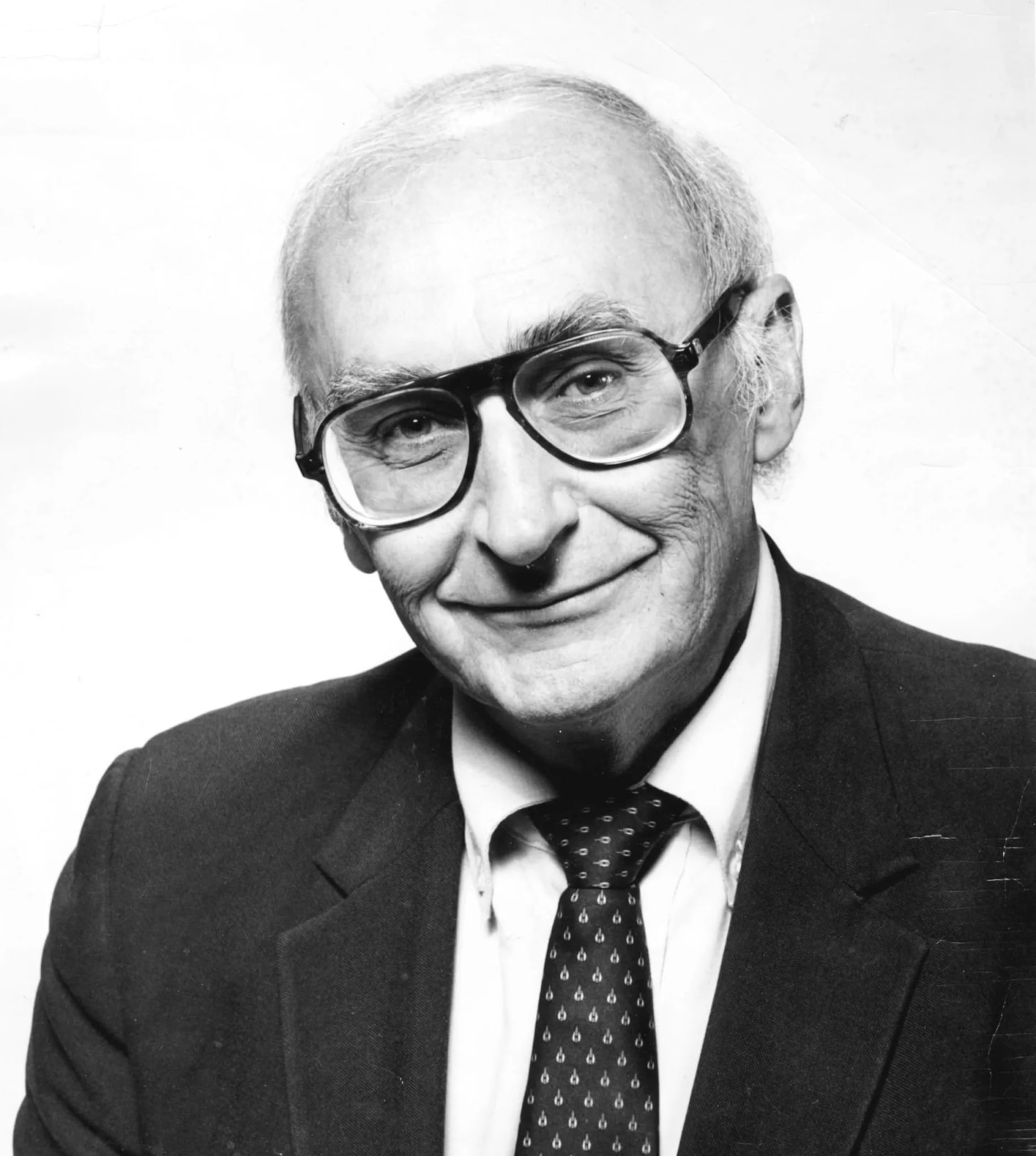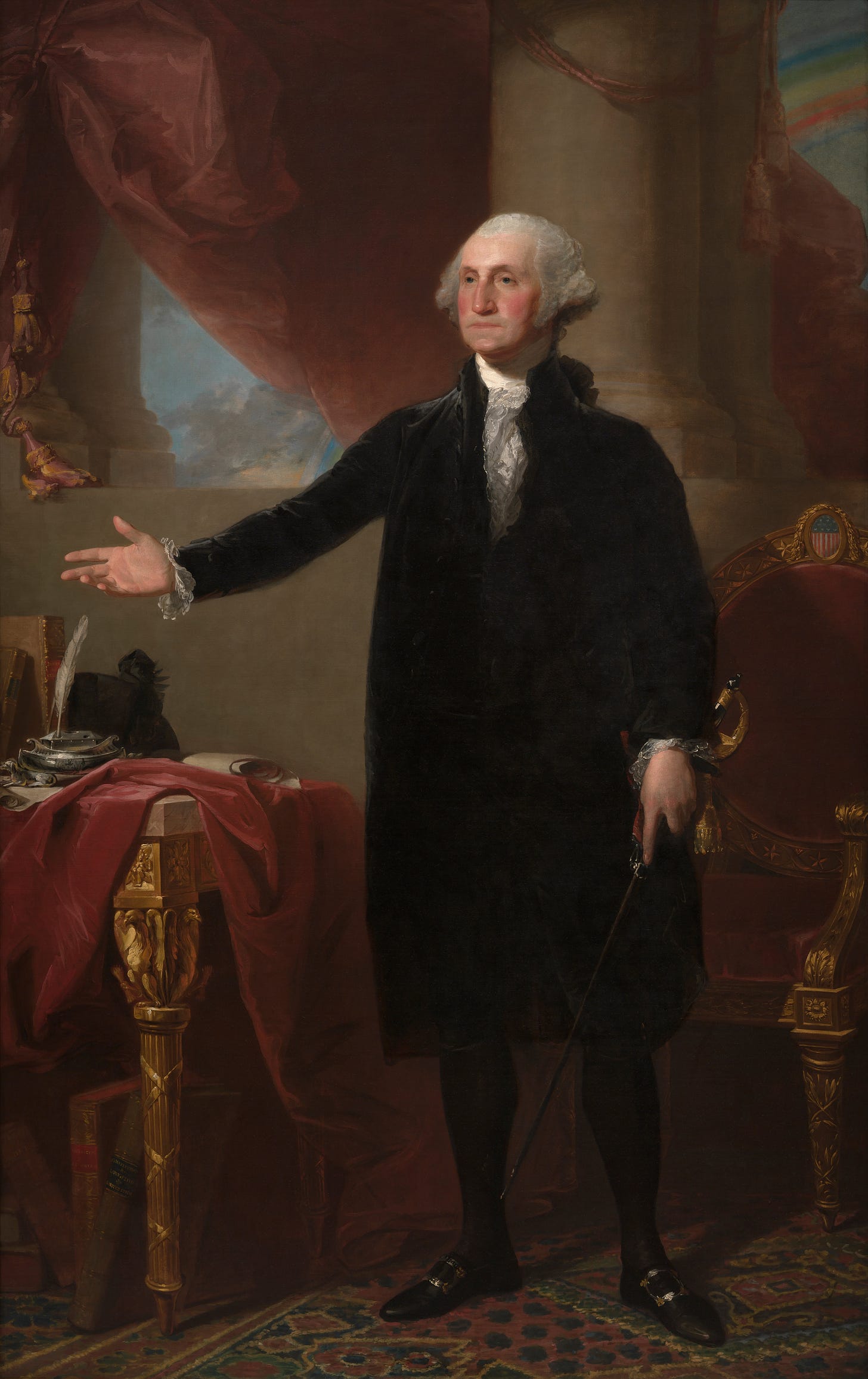(Jimmy Carter, 39th President of the Unites States)
In March of 1976 I stood at a podium in a large lecture hall on the Chicago campus of the University of Illinois, a few days before the Democratic presidential primary. The hall was packed with students and journalists, including the legendary Mike Royko of the Chicago Daily News. I glanced nervously offstage, waiting to spot the man they had all come to see, so that I could launch into my very brief and to the point introduction, in my capacity as president of the Circle Campus organization for the candidate. To my chagrin, I only saw my older brother Chris, also a volunteer, waving urgently for me to begin. But being already an experienced theater professional, I wanted to wait for the visual cue.
Which meant seeing Jimmy Carter standing there.
A few weeks before, in January, after Carter had won the then-still-obscure Iowa caucuses, I had gone round the campus putting up signs that read, “Jimmy Carter is coming to UICC!”
To which the nearly universal response was, “Who’s Jimmy Carter?” To which I would reply, “The next President of the United States.”
Then he won New Hampshire. Then Vermont. Then Florida. By the time the Illinois Primary rolled around on March 16th, people had begun to wake up to the momentum and startling freshness of the one-term former governor of Georgia with the dazzling smile and the humble demeanor. Illinois was viewed as a crucial test. He had won Florida in his native South, upsetting the openly racist George Wallace. But could he win in the industrial North, in a pivotal state without which the Democrats were unlikely to capture the White House? A skeptical news corps of cynical Chicago journalists blended with recently returned Viet Nam vets and inner city kids waited for Carter, ready to give him a tough reception.
I looked offstage again. Still no Carter. My brother waved frantically for me to begin the introduction. Okay, here goes.
“Ladies and gentlemen, it is my pleasure to introduce to you former governor of Georgia and candidate for the Democratic nomination for President of the United States, Jimmy Carter!”
Big applause. No Jimmy.
Instead, out strolls my brother Chris to the podium, where he says in his best Georgia drawl, “I’m glad y’all could be heah today…seriously, folks, Governor Carter is just freshenin’ up.” Amidst the catcalls and laughter, Chris then looked up to see Jimmy Carter standing behind him, wearing his trademark toothy grin - the crowd surmising correctly that Jimmy had had to relieve nature.
So it was my brother Chris, not me, who had the photo op of shaking the future President’s hand. Though I was fairly bummed at the time, it was only justice after all, as it was Chris who had gotten me enthused about Carter in the first place.
Jimmy Carter then launched into his standard stump speech about why he wanted to be President, and what his campaign was about. I can still remember the gist of it pretty much word for word. This was, we may recall, in the wake of the Watergate Scandal, the resignation of Richard M. Nixon, Gerald Ford’s pardon of Nixon’s criminal acts of obstruction of justice, and the humiliating Fall of Saigon which ended the bitterly divisive Viet Nam War, which had cost 50,000 American lives. Bitterness and cynicism had set deeply into the American psyche over the 13 years since the assassination of John F. Kennedy, who some regarded as the last authenic American president.
Carter spoke with quiet simplicity in his soft-spoken but firm Southern tones.
“I love my country, and I know you do, too. I believe we can have a government as decent, as honest, and as compassionate as the American people.”
He went on to speak of healing, and of amnesty for protestors who had fled the draft during the war. Tough questions were called out from vets and skeptical students. Carter handled them calmly and candidly, and asked for their votes. Then he was out the door and on to the next campaign stop.
The next day, Mike Royko, the brilliantly sardonic Pulitzer Prize-winning journalist and commentator who had exposed Chicago’s endemic corruption for years, wrote a column actually praising a politician, noting Carter’s sincerity and calmness in the face of the hecklers at the campus event.
(Legendary Chicago journalist Mike Royko)
Royko was daily religious reading for hundreds of thousands of Chicagoans. The campaign staff estimated that this favorable column from Royko was worth 50,000 votes.
Jimmy Carter won the Illinois Primary handily, and went on to survive a desperate effort by the Democratic establishment to deny him the nomination, defeating Gerald Ford in November to become the first Democratic candidate to reunite the old “Solid South” in decades.
He was a peanut farmer, a nuclear physicist, a submarine Lieutenant Commander in the U.S. Navy, and an unabashed born-again Christian. He told America that human rights mattered, that American policy should be dictated by concern not for the realpolitik of cynical manipulators like Henry Kissinger, but by concern for the rights of the populations among both our allies and our adversaries. He bravely grabbed the historic opportunity afforded by Egyptian President Anwar Sadat’s overtures of peace to Israel (a stance which later cost Sadat his life) and negotiated the historic Camp David Accords between Israel and Egypt, which forever changed the landscape in the Middle East, and brought some years of peace to the region.
He actually attempted to live up to George Washington’s call for how America should behave in the world, from the Farewell Address given as our Founding Father peacefully surrendered power in the first presidential transition in 1796:
It will be worthy of a free, enlightened, and, at no distant period, a great nation, to give to mankind the magnanimous and too novel example of a people always guided by an exalted justice and benevolence. Who can doubt that in the course of time and things the fruits of such a plan would richly repay any temporary advantages which might be lost by a steady adherence to it? Can it be, that Providence has not connected the permanent felicity of a nation with its virtue?
(President Washington, the famous Gilbert Stuart portrait)
Carter steadfastly adhered to making human rights the cornerstone of American foreign policy. And then came the fall of the Shah of Iran, the rise of the autocratic Ayotollah Khomeini, the seizure of the American hostages in the Tehran Embassy, and the long humiliation of the standoff, which only ended as Ronald Reagan was being inaugurated in January of 1981.
For years Carter was dismissed as a footnote, as a failed president who had set the Democrats back for a decade. But then he went quietly about living the life of a man genuinely committed, so it would seem, to the teachings of Christ. You know, caring for your fellow man, feeding the poor, building them homes, and encouraging democracy around the world through observation of suspect elections by international volunteers. His reputation rose as the years went by, with his lifelong parter Rosalynn at his side, humbly picking up hammer and nails to help build the homes himself.
He outlived every other former president and became a living symbol of genuine American virtue. I am proud to have worked for him, proud of that perhaps pivotal appearance in Illinois (and grateful, after all, to my brother Chris, who went on to serve as White House liaison to NASA for the Clinton Administration).
And now there will be a state funeral for this great American, just as a man of quite different moral character once more takes the Oval Office. Let the stark difference remind us of who we once were, who we can still be, and what we ought to expect of our leaders.
blessings,
Michael







Jimmy Carter Dies at 100
••••
An Open Letter to President Jimmy Carter
Dear President Carter,
In a time when the words “Christian values” are often wielded as weapons by those who seem unfamiliar with their essence, your life remains a testament to what they truly mean: love, humility, service, and unyielding moral courage.
As the 39th President of the United States, you brought a quiet dignity to the Oval Office, pursuing peace where others stoked conflict. Your leadership in brokering the Camp David Accords showed the world that diplomacy, grounded in faith and principle, could triumph over cynicism and division. And while history has recognized your presidency more kindly with each passing year, it is your post-presidency that stands as the gold standard of what an ex-president can and should be.
From eradicating diseases to building homes for those in need, your work with the Carter Center and Habitat for Humanity has been an unparalleled legacy of compassion. You didn’t retreat to a gilded life of grift and spectacle but chose instead to labor humbly, embodying your spiritual call to serve “the least of these.”
In an era defined by loud self-aggrandizement and moral bankruptcy—where some falsely claim your faith while trampling its core tenets—you are proof that decency is not weakness and that true greatness lies in the quiet, steadfast work of lifting others up.
Thank you, President Carter, for showing us what goodness looks like.
Rest in Peace.
Sincerely, A Grateful Admirer
https://substack.com/@patricemersault?utm_source=user-menu